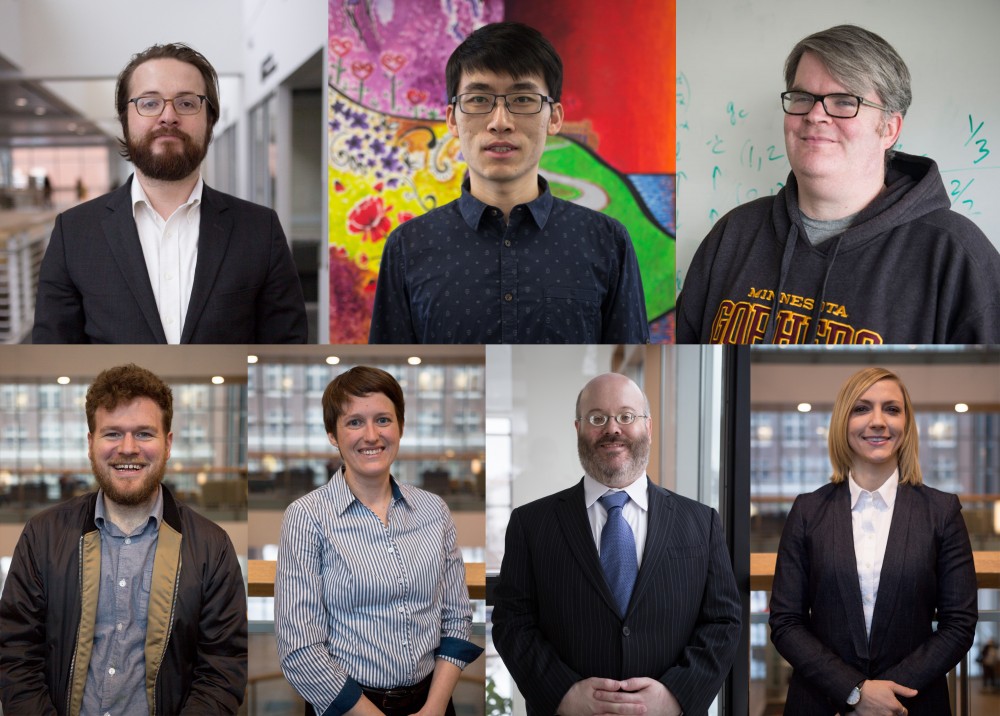As student government elections are just weeks away at the University of Minnesota, seven candidates — an increase compared to participation in recent years — are ramping up their campaigns for two presidential positions serving the graduate and professional student bodies.
Professional Student Government presidential candidates
Sonya Ewert received her undergraduate degree in Environmental Science at the University in 2009 and is now working toward her master’s degree in business administration at the Carlson School of Management.
Ewert serves as a Minnesota Business Administration Association representative to PSG.
She said her goals for professional students include increasing PSG’s involvement around campus, ensuring fair funding for professional students and utilizing PSG’s ambassador positions to make sure all voices are heard.
Ewert’s campus-wide goals include resolving campus security concerns and continuing the current work on sexual harassment prevention and mental health awareness, she said.
Alanna Pawlowski is a graduate student working toward a dual-law degree, including a master’s in public policy.
Pawlowski said her platform focuses on the involvement of PSG throughout interdisciplinary connections, racism and bias and sexual violence.
Though not a member of PSG, Pawlowski believes that her experience as co-president of the University Law School’s Minnesota Justice Foundation and her position as a student representative on the Law School’s Interdisciplinary and Joint Degree Committee has given her a unique perspective into the policies that affect the University.
Michael Sund said he dedicated his life to public service the day George Zimmerman, who shot Trayvon Martin, was found not guilty of second-degree murder.
Sund is working toward a master’s degree in public policy with an emphasis on election administration and currently serves as a representative for the Humphrey School of Public Affairs to PSG.
His platform includes visibility of marginalized post-graduate students, building spaces to talk about racial and gender inequality and ensuring voices from coordinate University campuses are being heard, he said.
“This is not a line on a resume. It is something I hope to do the rest of my life,” Sund said.
Council of Graduate Students presidential candidates
COGS Chief of Staff Jonathan Borowsky has been involved in the organization since 2015.
The main goal of Borowsky’s campaign is to build effective committees to work on advocacy for students.
Borowsky plans to reboot COGS’ current Mental Health and Wellness committee as well as introduce new committees to address sexual misconduct policy, diversity and equity.
Additionally, he said he wants to address free speech and the right to protest on campus.
“More than any particular policy issue, what I want to do is leave behind a structure for graduate students to have that experience of working together to make themselves heard,” Borowsky said.
Sean Chen, a doctoral student studying chemistry, serves as COGS’ student representative to the Board of Regents and is running for president and vice president.
Chen hopes to improve the overall campus environment through diversity, inclusion and increased safety measures regarding sexual harassment.
“Tenured professors are not held to the same standards,” Chen said regarding sexual misconduct.
He said other critical issues facing graduate students are mental health services, advisor-advisee relationships, childcare and immigration.
Ryan Machtmes lists three main pillars that he believes are essential for representing the needs of graduate students.
He said the three pillars are advocacy for the needs of a diverse student body, improving student safety and transparency and ethical governance.
Machtmes serves COGS as the student representative to the Graduate Education Council.
He received his master’s for applied statistics and is in the process of earning a doctorate in evaluation studies.
Scott Petty, though not a current COGS member, was an officer for two years and helped to co-write the constitution and bylaws of COGS.
Petty said he rejects the idea of a platform, but emphasized the need for social interactions and inter-departmental connections amongst post-baccalaureate students.
“We live in silos. You get dropped into your department … and there is nothing provided by the University that connects you to anything outside it,” he said.
Petty received his master’s degree in economics and is currently working toward a doctorate in applied economics.
Correction: A previous version of this article incorrectly stated Machtmes’ role with COGS.








